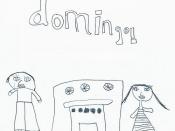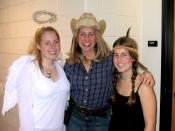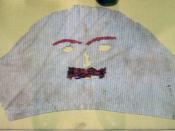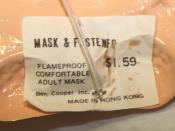Lucy Grealy At one point or another, everyone has felt shame and self-doubt about physical inferiority. In Autobiography of a Face, Lucy Grealy's struggle with cancer appeared minor in comparison to her feelings of repulsiveness because of the deformity it caused. While coming to terms with who she is, the effects of society's stress on beauty and its unforgiving cultural mirror is enhanced by her gender. Females in our society feel more compelled to adapt to the prescribed standards of attractiveness. By means of positive and negative events, she transforms her misfortune into a revelation about beauty and universal truths.
The confusion and loneliness of childhood began to engulf her as children began to tease and treat her as inferior: "Hey girl take of your monster mask - oops. She's not wearing a mask!" (118). The Chemotherapy caused hair loss and a sickly appearance and the numerous operations left her face deformed.
She felt ugly as a response to people's public display of shock. As if the stares and whispers were not harsh enough, some children would even call her 'baldy' as they would run past and knock off her hat. At school, girls would gaze at her disfigurement and boys would laugh shamelessly as they pointed and blurted out insults. All of these experiences added to the sense of shame that consumed her. Our culture's preoccupation with physical beauty is definitely manifested in our youth and adolescents. At an early age, Lucy was exposed to the cultural drive for perfection in exchange for acceptance.
Halloween was a treasured night for Lucy as she was growing up. It gave her an opportunity to break out of her shell and let her true personality shine through. Behind a mask, she felt protected from any nasty comments because no one could acknowledge her physical flaw. Without a second thought, she would ask questions and make bold comments. One of her observations led to one of her eventual revelations. "My sister and her friends never had to worry about their appearance, or so it seemed to me, so why didn't they always feel as bold and as happy as I felt that night?" (120). In the long run, she recognizes that people have to come to terms with feelings of ugliness and imperfection and that people will always be envying someone else's life. She was not completely alone in her feelings of deficiency. The stress for beauty is placed on all women, and most feel they also have shortcomings in attractiveness.
Lucy found a source of refuge from society's viciousness in animals. She vowed to love her dogs and cats so extensively that it would prove her worthy to receive that same sort of love. Her romantic relationship with her horses supplied her with the understanding that the characteristics that make people beautiful are not always visible. There was a complete trust that aided in the binding of their personalities. Her days spent with the horses were filled with smiles, laughter, and happiness. Performing well with the horses gave her a sense of self-pride and accomplishment to center her life around. Society made her feel too ugly for love or acceptance.
The animals were not influenced by her outward appearance, but instead by her actions, personality, and spirit: "Horses neither disapproved or approved of what I looked like. All that counted was how I treated them, how my actions weighted themselves in the world" (152). These ideal relationships not only allowed her to experience the valiant, true, intense love she longed for in human companions, but also gave her a way of coping with her loneliness. She also came to understand the real beauty of the world, the beauty that swells beneath the surface of every being.
The harshness of her peers did not end when she became older. Groups of drunken men would hoot at her from a distance, but taunt her once they saw her face. The boys in High School had done the same thing, but instead would become silent with rejection when they saw her face. Another incident that smothered her self-esteem happened when a homeless man, begging for money, approached her from behind. When she turned around and revealed her face, he apologized and gave her a dollar bill. These occurrences demonstrate the intricate relationship between beauty and self-respect in our society. The improper, crude, drunken men were only trying to come across as tough and cool to their friends. The homeless man evidently illustrates that even though he probably doesn't have a job, education, or economic status, he considers her ugliness to make her worse off than him. Her feelings of inadequacy were confirmed by society's relentless treatment toward her appearance.
During one of her recessions in self-esteem, her friend form college, Greg, pulled her up by taking her dancing at gay clubs. Being encompassed by homosexual males gave her a blanket of security: "No one took notice of me - I was without value in this world. It was easy to sublimate my own desire and sustain my feelings of physical worthlessness" (201). She knew that none of the men there cared about her attractiveness because in their minds she was no less desirable than any other female. As each beat of the music moved through her body, she was able to let her emotions escape. During her senior year of college she met a group of transvestites that experimented with her femininity by spreading on loads of makeup. These experiences helped begin to define her feminine appearance and acceptance from males.
Lucy believed that not having a lover meant she was ultimately unlovable, and too ugly to ever get a lover. Sex was her salvation. "If only I could get someone to have sex with me, it would mean I was attractive, that someone could love me" (206). Miniskirts, garter belts, high heels and her dedication to her healthy, fit body allowed her to be more feminine as she added to her list of sexual encounters. Her certainty that only love from another person could prove her value left her looking for love in all the wrong places. How she, as a woman, would find her place in society would not be truly revealed to her until later. Sex and fashion did not fill her void, but did play an important role in her self-definition and insight for need of something more definite.
In our society, women are especially pressured to wear their beauty on the surface. Lucy found hers within as she accepted her obvious disfigurement. After this revelation she experienced a moment of freedom: "I'd had [freedom] behind my Halloween mask all those years. As a child I expected my liberation to come from getting a new face put on, but now I saw it came from shedding my image" (222). Throughout her life she tried to overcome the teasing, the stares, the whispers, the absence of love, and the overall harshness of her peers by finding outlets for her oppressed emotions of loneliness. Although Halloween, animals, dancing, fashion expression, and sex gave her some compensation, none of these could give her complete self-assurance. She had longed to be accepted by society's standards, but came to terms with her feelings and acknowledged her true self. As her soul unfolded, her personality was no longer restrained by feelings of insecurity and need to conform to feminine standards.





